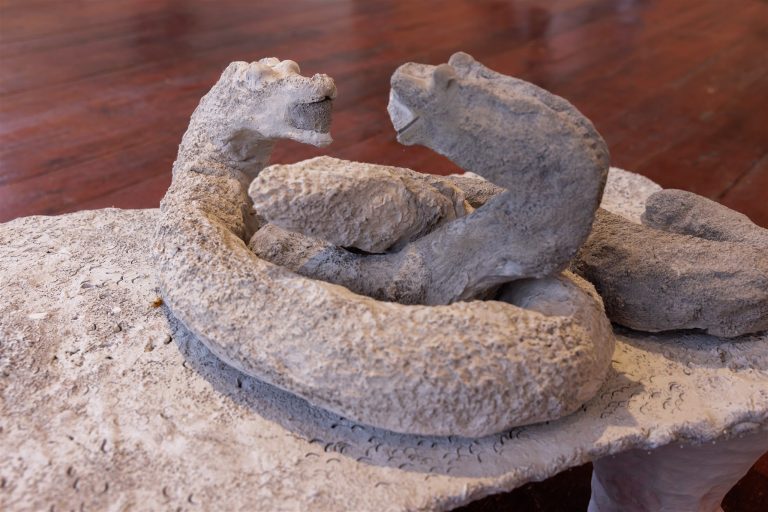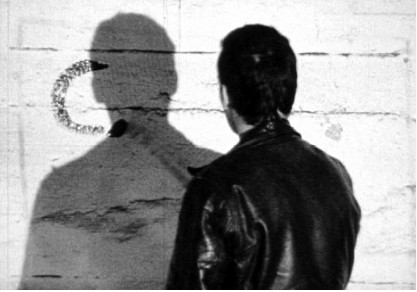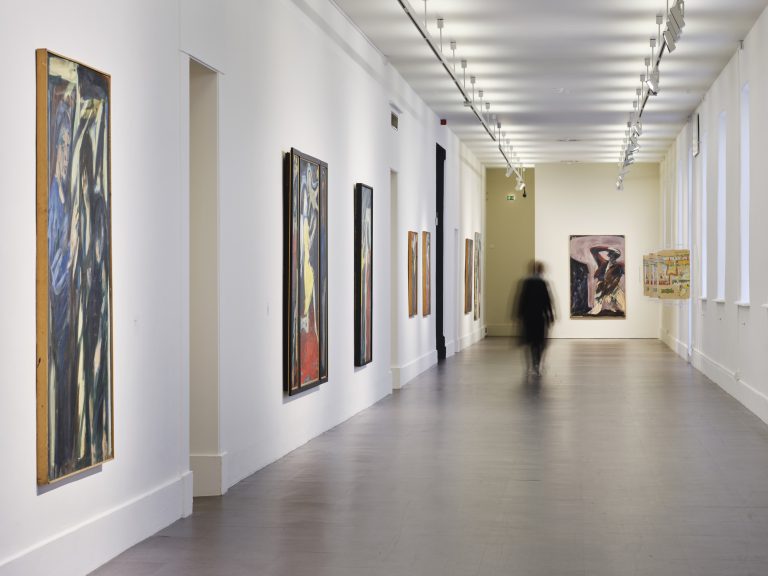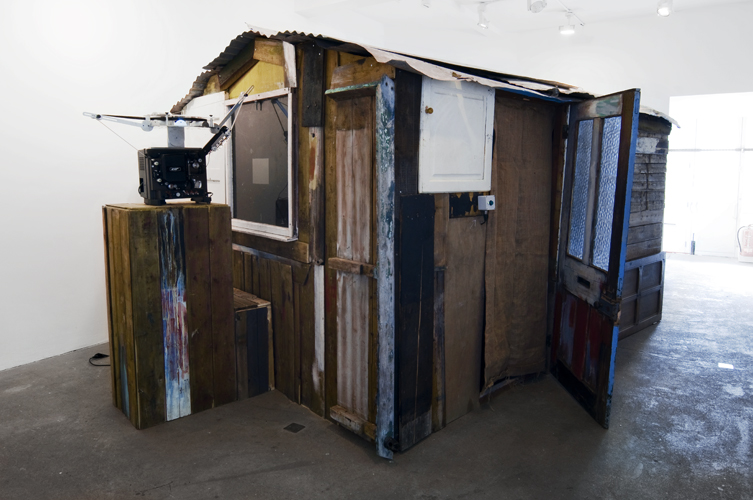
Ben Rivers: Origin of the Species
Installation view
2010
Image courtesy of Kate MacGarry.
A haphazardly constructed shack sits in the centre of Kate MacGarry, almost over-large in the neat gallery space, with the back cut away for a projector. Paint peeling and door slightly askew, I enter to find a tiny, ramshackle cinema. Light creeps in through the slats, a musty smell permeates the room and the film looper hums agreeably. Fashioned from odds and ends: painted timber slats, corrugated iron and cupboard doors, this makeshift construction gives the impression of great resourcefulness – ironic given that it resides in the great metropolis of London, where surely any material can be sourced almost immediately. This gap between civilised society and the natural world has long been a source of inspiration for Rivers. The film, Origin of the Species (2008), immerses us in the world of S., a man living alone in the Scottish wilderness at both a physical and ideological remove from the rest of society. Shot on a vintage Bolex camera, the crackling quality of the film is in keeping both with the theatre in which it finds itself, but also the story that it tells.
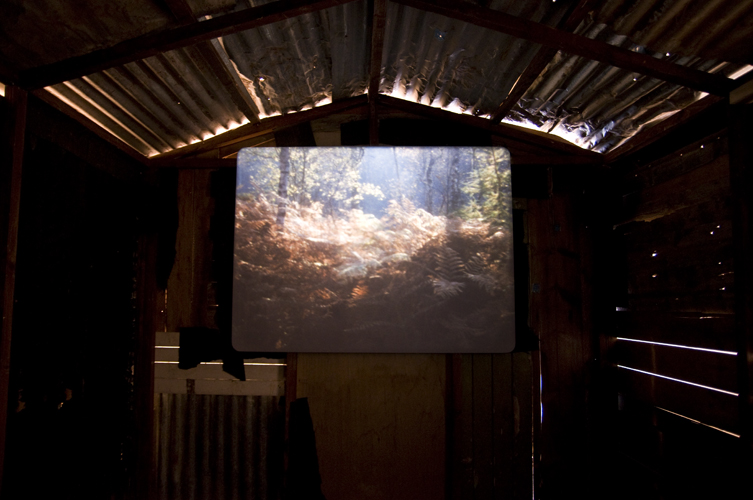
Ben Rivers: Origin of Species
Installation shot
2010
Image courtesy of Kate MacGarry.
Enveloped in a misty haze, the light in Origin of the Species conjures up a mysterious atmosphere. It opens with a number of detailed shots of the constructions of nature, focusing on details of plants and cobwebs. The camera enters a clearing where the impact of man – a small pitched roof shack – is visible. The shots have been carefully composed and overall its muted tones have a beautiful textural quality. The film proceeds at a leisurely pace. A flicker of orange bursts across the screen when the end of a reel is reached since the Bolex allows continuous shots of no longer than half a minute. This mirrors the discontinuous narration. Yet this dreamy sensibility should not be interpreted as a nostalgic vision of a more simple lifestyle. The extreme close-ups distort what we see; a lingering shot of the undergrowth resembles a view of some far-distant nebula, a pool of oozing liquid becomes a vast ocean. This produces a slightly sinister undertone. The sound of wind can be heard throughout and seems to warn against underestimating the power of nature – something that man has not yet fully understood or conquered.
Throughout, S., an elderly though robust individual, can be seen working in his cabin, fixing things, contriving various contraptions to cope with the wilderness around him and drawing diagrams of new inventions. We catch glimpses of him between trees, dressed in utilitarian plaid shirts, woollen sweater, jeans and wellies, with close-ups of his face appearing only very occasionally. This has the effect of transforming him into an everyman figure, becoming more representative of the inquisitive nature of man than an individual personality in his own right. The voiceover is intimate, like a fireside story being told at a gentle ambling pace. The sound crackles as S. recounts his studies of the universe and his fascination with Darwin: “evolution’s been my bag for an awful long time.” Rivers points to shift in temporality evident in a life lived at a distance from the fast-paced modern world. Inspired by working in amongst nature, S.’s investigations have been conducted through lengthy observation and experience of the phenomena around him.
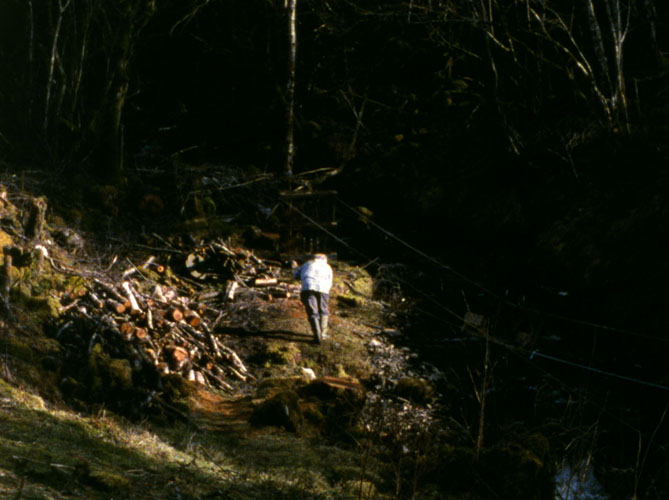
Ben Rivers: Origin of the Species (still)
16mm, 16 minutes
2008
Image courtesy of Kate MacGarry.
Discussing the random nature of evolution, S refers to the development of humankind as “it’s all, it’s just trouble, there’s just trouble.” That someone must be present to hear a tree falling becomes for him a bittersweet reflection on nature; since animals do not have the consciousness to consider its meaning, mankind must exist to appreciate it. Yet that higher intelligence will destroy that beauty in the attempt to understand it. This can be seen in the very tasks that S. himself undertakes, producing vast billowing clouds of smoke from building fires and leaving debris behind while building his mysterious machines with their lines and pulleys. The close-up of his hands drawing and inventing not only serve both as a celebration of the imagination and range of the human mind, but also as a reminder of the damage that it has done to the planet. That man kills the thing he loves is, for S., the unbearable irony of this world.
Origin of the Species is neither a straightforward narrative, nor a paean to bucolic bliss. More evocative and suggestive, Rivers described his films as a method of working through things.[1]Avoiding sentimentality, his portrayal of a figure typically regarded by society as eccentric, mad even, functions more like an anthropological inquiry and leads us to wonder whether our initial impressions are more problematic than first supposed. We must also bear in mind the relationship between film-maker and filmed. S addresses Rivers throughout and tells his story but Rivers maintains editorial control and adapts this personal history to ask what this figure on the fringe can tell us about our world – about man’s quest for knowledge and the conflict between civilisation and the wild.
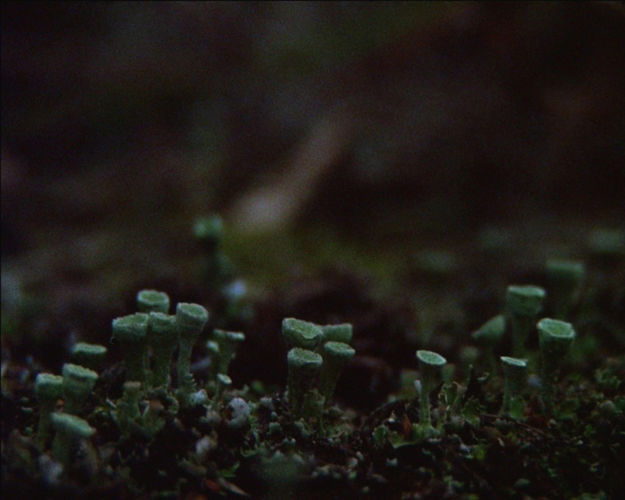
Ben Rivers: Origin of the Species (still)
16mm, 16 minutes
2008
Image courtesy of Kate MacGarry.
Emerging from the darkened cabin, I felt convinced of the film’s merit as a profound meditation on fundamental, universal themes. So, why the shack? Is it intended to plunge the visitor into the total sensory experience of the Gesamtkunstwerk so that we discard the preconceptions encouraged by the modern world? Perhaps the cabin itself becomes a symbol of the effort to tame nature; the one in the film appears almost besieged by the wild growth of plants which surrounds it. What, then, does its transplantation to the gallery mean? Incongruous in its clean white surrounds, the mismatched planks and higgledy-piggledy aesthetic do point to the accidental beauty of man’s resourcefulness. Overall though, not only is it disconcerting to be inside a cabin, watching a cabin – to see what should be outside the shack inside – it seems wholly unnecessary and does not particularly enhance the film or add to its message. Rivers should trust in his film-making enough to let Origin of the Species stand on its own merits.
Ciara Moloney is a writer who lives and works in Dublin.
[1] ‘Ben Rivers: Origin of the species’ Interview, Rotterdam Film Festival, 2009.

